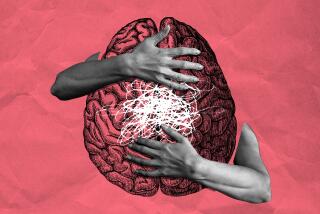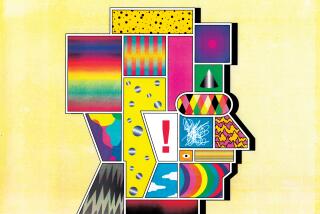Harnessing our yen for sex, drugs and food to deliver medicine
You might think from reading the medical news these days that our voracious appetite for food, drugs and sex is a bad thing. That neglects clear evidence that the powerful and reliable impulse to do things that make us feel good has been essential to our survival as a species.
So it was just a matter of time until someone figured out how to harness those dependable hedonic impulses to improve our health. In a clever bit of bioengineering, a group of Swiss researchers has done just that, building a pleasure-triggered device that, in mice, prompts the production of a natural agent that lowers blood pressure.
Published Monday in the journal Proceedings of the National Academies of Science, the study promises a revolution in the patient experience. If the techniques pioneered here can be scaled up for use in humans -- admittedly a big if -- patients who must take steady doses of medication might be given bioengineered cells instead. Those cells would be programmed to turn on and off the flow of medication implanted in tiny internal dispensaries, taking their cues from the ebb and flow of chemicals released in the brain and then detected in the bloodstream.
Such bioengineered devices could provide patients with “seamless and self-sufficient drug dosing at regular intervals,” the authors wrote. More important, the devices “could make the taking of pills in specified amounts and in precise doses a thing of the past.”
The device at the heart of such a system is not made of steel or plastic. It’s biological: The study’s authors cultured cells from a variety of sources, including human embryonic kidney cells, and packaged them in microcontainers and introduced them into the bloodstream of mice. The implanted cells were chosen for their sensitivity to dopamine, a neurotransmitter produced in the brain in response to palatable food, alluring sexual partners and addictive drugs or drink.
In response to sugar water, methamphetamine or a sexually available female mouse, the brains of hypertensive male mice revved up their production of dopamine, which began to spill into the bloodstream outside the brain. As its concentration rose, the dopamine triggered the implanted cells to effect a cascade of chemical changes. Eventually, those changes flipped the “on” switch of a pump implanted into the visceral cavities of the mice that releases the diuretic hormone known as atrial natriuretic peptide.
Read more:
High blood pressure damages brain long before old age
Cutting salt could save hundreds of thousands of lives, study says
pleasure-sensor that helps hypertensive mice effortlessly control their blood pressure







